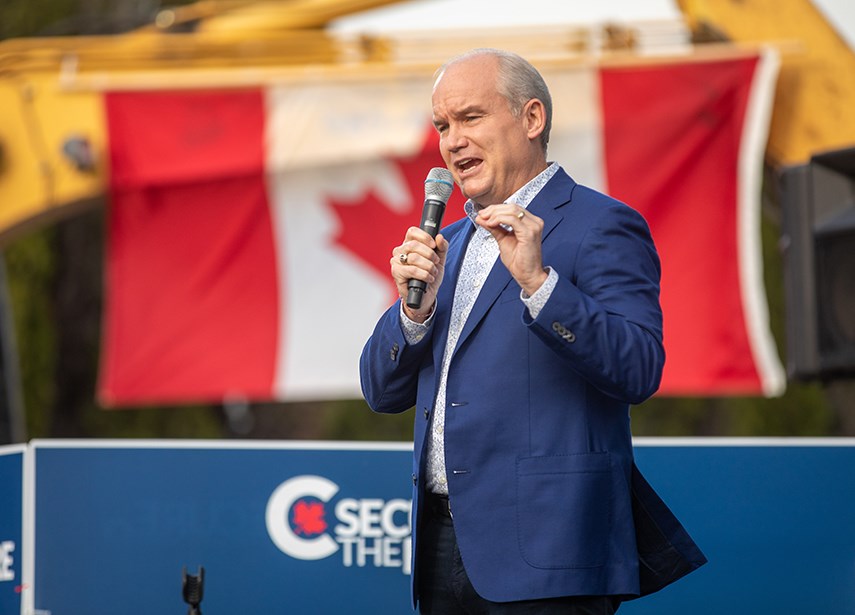And just like that, the performance art featuring Erin O’Toole was a show that could not go on.
O’Toole’s experimental, avant-garde, gymnastic feats – the daily balancing act of rival views in the job definition as Conservative leader – ultimately proved alienating to the rest of the ensemble and inaccessible even to the dyed-in-the-wool supporters.
When he took the act to the larger stage in an election and it didn’t prove crowd-pleasing, his days as the lead actor were numbered. In will come a rewrite of the play and a new person on centre stage.
How strange, given he was the kind of frontman that seemed straight out of central casting: uncontroversial on most issues, experienced in serving the country, adroit but not filthy rich from a career in law, someone in the type of bedroom community that today wins or loses Canadian elections.
But as we know, and as his successor will find out, the people who can elect you as leader are not necessarily the people who can elect you as prime minister. What’s more, they don’t congregate any more at a convention, party hearty, twist arms, conjure deals and create spontaneous coalitions by walking across the floor en masse in sweaty high drama to build momentum and portray to the country a stronger sense of brand unity.
Today’s party leadership votes are cast mechanically, clinically, remotely online and usually elect a second or third choice without that visceral, physical foofaraw of an endorsement in an arena. The drama is surrendered to a computer, which knows the outcome of the ranked ballots the second they are cast. Any suspense for the television audience has to be fabricated, and the evidence is emerging that his technique of choosing a leader is more often than not producing an unsatisfactory compromise.
In O’Toole’s case, he positioned himself so forcefully as a Let’s Take Canada Back guy of the hard-right in seeking the Tory title that he raised surreal expectations with those leadership supporters – and instilled apprehension in those who might have made him the country’s leader.
His acceptance speech on that August 2020 evening walked back much of the leadership rhetoric, but his attempted metamorphosis was unconvincing. No matter that his harder-line policies softened, even sometimes flip-flopped, his effort to broaden the Tory tent was met with skepticism at best and resistance in the main. It also gave his early backers a reason – some sense of betrayal – to commence the morning after the 2021 election what culminated Wednesday in dismissal.
O’Toole could not put his leadership campaign in the rear-view mirror; indeed, it was the backseat driver. Along the way, Justin Trudeau used the arrival and administering of the coronavirus vaccine as a perfectly timed wedge issue to reveal the fissure in the Conservatives that O’Toole could not paper over during his campaign.
It was fair to ask: if you can’t or won’t persuade as a party leader your rank-and-file MPs to be vaccinated, what does it say about your credibility in leading the nation in this or any future emergency? If you can’t or won’t put aside partisan differences to politically unite on an issue like the pandemic, what does it say about your capability to take the high ground as leader?
The ending Wednesday, ironically, was owing to a conscientious Conservative MP, Michael Chong, who during the Stephen Harper administration introduced the Reform Act, a private members’ bill that shifted power to MPs by permitting a majority of them to oust their leaders. It is unlikely he had this kind of swift post-election exercise in mind as a first application.
The discussion now in the party will be whether to emulate or differentiate from the sitting government and to what degree. Any prediction about this is as dependable as one on the eventual value of cryptocurrency.
There is no unifying force in the wings. There is hardly even an ideal interim caretaker, although MP Candice Bergen will play fair. There is obvious wreckage from the MPs’ impulse and the party is back in the dark ages of division.
There is only certainty that the implosion Wednesday can please no one more than the prime minister. He may be riven asymptomatically with the coronavirus, but the phenomenon has proven so politically good for him.
Kirk LaPointe is publisher and editor-in-chief of Business in Vancouver and vice-president, editorial, of Glacier Media.



